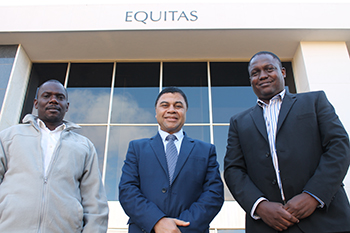Latest News Archive
Please select Category, Year, and then Month to display items
26 January 2019
|
Story Lacea Loader
![]()
The executive management of the University of the Free State (UFS) has noted with concern the disconcerting effects of the current political and economic crisis and instability in Zimbabwe – specifically with regard to the effect it has on its students from Zimbabwe.
“As part of a coordinated support effort driven by the UFS Office for International Affairs we have invited Zimbabwean students to communicate their individual challenges regarding finance, travel, and special examinations to us.
We have received various reports about problems with delayed visas and have appealed to the Department of Home Affairs to consider concessions for our affected Zimbabwean students,” says Mr Cornelius Hagenmeier, Director of the university’s Office for International Affairs.
Arrangements are being made on a case-by-case basis for students who were unable to register before the closing date. Students who have reported travel challenges are also being contacted individually to consider possible support.
“As an institution committed to the furtherance of social justice – not only on our campuses, but also in the wider Southern African region – the UFS wants to encourage our affected students not to abandon their all-important education plans in the light of the turmoil and obstacles they are currently facing. As a university community, our heartfelt sympathy goes to our Zimbabwean students and their families during these trying times,” says Prof Francis Petersen, UFS Rector and Vice-Chancellor.
Released by:
Lacea Loader (Director: Communication and Marketing)
Telephone: +27 51 401 2584 | +27 83 645 2454
Email: news@ufs.ac.za | loaderl@ufs.ac.za
Fax: +27 51 444 6393
UFS hosts YSI for first conference of its kind in Africa
2017-06-13

From the left: Bryson Nkhoma, a doctoral student from
the International Studies Group, Prof Francis Petersen,
Rector and Vice-Chancellor of the UFS, and
Dr Tinashe Nyamunda, a postdoctoral fellow from the
International Studies Group.
Photo: Siobhan Canavan
In the first conference of its kind on the African continent, the University of the Free State’s Bloemfontein Campus was privileged to host the Young Scholars Initiative (YSI) conference.
Reflecting on the African experience
A total of 65 young and senior scholars from five continents attended the conference Decolonising Africa? The Economic History of Development, hosted by the YSI in partnership with the International Studies Group at the UFS.
The conference, held on 8 and 9 June 2017, provided an opportunity to reflect on the African experience from an historical perspective and to assess the current position of the continent in the global economy. It discussed new themes in development, such as the role of women, minorities and entrepreneurs.
The conference focused on how the business community has operated in an Africa that still faces inequalities and unfair terms of trade and lacks a unified political will.
Keynote speakers at conference
Prof Francis Petersen, Rector and Vice-Chancellor of the UFS, said decolonisation was not self-explanatory. “In its radical form, decolonisation presents two polar opposites. On the one side is white privilege and on the other is black pain.”
Prof Ian Phimister, Senior Research Professor at the Centre for Africa Studies at the UFS presented the opening keynote address entitled International Imperialism: The Violent Making of Southern Africa, 1884-1914.
Other keynote speakers included Prof Sabelo Ndlovu Gatsheni from the University of Pretoria, Prof Gareth Austin from the University of Cambridge, and the closing keynote by Prof Alois Mlambo from the University of Pretoria.